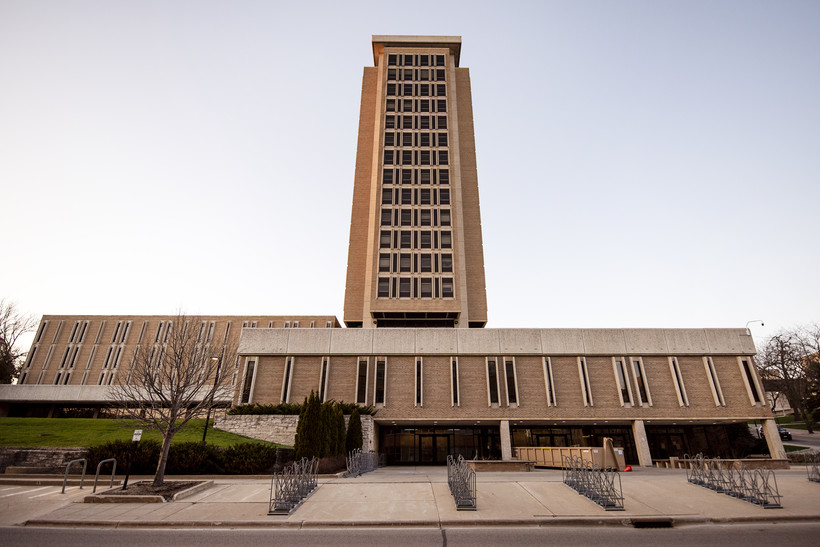UW System President Wants Tuition Freeze Extended
New system leader Jay Rothman will recommend extension to the UW Board of Regents.

Van Hise Hall on the University of Wisconsin-Madison campus Friday, April 2, 2021, in Madison, Wis. Angela Major/WPR
New University of Wisconsin System President Jay Rothman will recommend freezing in-state, undergraduate college tuition for another year. And he said a student free speech survey, which led to the resignation of an interim chancellor at UW-Whitewater, will be sent out during the fall semester.
Rothman started his tenure as head of the UW System’s 26 campuses Wednesday. He told Wisconsin Public Radio in an interview Thursday that administrators are in the early stages of developing a new strategic plan for the state’s public universities.
Rothman said system leaders will consider tuition rates at peer institutions along with the economic situations of incoming students. This summer, Rothman said he will craft a UW System budget proposal that will be reviewed by the UW Board of Regents and Gov. Tony Evers.
“And that budget will contain my recommendation that we have a tuition freeze for next year for in-state undergraduate tuition,” Rothman said. “So I’m pleased about that because I think that does go to the affordability side.”
Rothman’s budget recommendation will be considered by the UW Board of Regents at its next meeting, which takes place June 9 and 10.
Tuition at the UW System’s four-year universities has been frozen since 2013. If Rothman’s recommendation goes into effect for the upcoming academic year, it would mark a full decade in which the state’s four-year universities have not been allowed to increase in-state tuition for undergraduates. State lawmakers returned authority to raise tuition to the Board of Regents last year, but lawmakers warned former UW System Interim President Tommy Thompson against tuition increases.
Rothman faces GOP criticism of higher ed
As Rothman begins to make his mark on the UW System, he will be navigating intense criticisms from Republican state lawmakers of public higher education.
One sticking point of late is whether college campuses support and value conservative viewpoints. Republican lawmakers, and conservatives in general, have suggested they do not.
The survey was developed by UW-Stout’s Menard Center for the Study of Institutions and Innovations and the UW System’s Wisconsin Institute for Public Policy and Service in Wausau. A copy of the survey obtained by WPR in April asks students about opinions on diversity; whether giving voice to unpopular or offensive viewpoints encourages healthy academic dialogue; and whether they’ve felt pressured by a professor to agree with a specific political or ideological opinion in class.
The survey was initially paused in March, which frustrated Republican lawmakers like Rep. Dave Murphy, R-Greenville, who’s the chair of the state Assembly’s Colleges and Universities Committee. The survey was set to go to students in April, but was paused again following Henderson’s resignation from the Whitewater campus.
Rothman said his intent is to take the survey to students this fall.
“But it really opens up a broader issue in my mind, and that is the whole issue around freedom of expression and civil dialogue, and that the universities have to be a central point for that process,” he said.
The UW System has an ongoing initiative to “try to provide additional support to our universities about how they may think of that issue differently,” Rothman said.
In December, Republican state lawmakers, including Murphy, introduced legislation that would punish universities and technical colleges found to have violated freedom of speech and freedom of expression on campus. The bill, which did not pass during the prior legislative session, would allow individual members of the UW Board of Regents or technical college boards to be sued for up to $100,000 if a judge, district attorney or state attorney general decided rights were violated.
The issue of critical race theory — an academic legal framework to help identify the effects of structural racism on policy that’s more recently been incorrectly used to describe K-12 and undergraduate level teaching about race, history and equity — has also become a political minefield for the UW System. Last year, Wisconsin lawmakers introduced legislation that would limit how race and racism are taught in K-12 schools and UW System campuses.
When the UW Board of Regents announced a unanimous vote in May to hire Jennifer Mnookin — former law school dean for the University of California, Los Angeles — as UW-Madison’s next chancellor, Republican lawmakers and candidates running for governor and state attorney general attacked the board and Mnookin. A statement from Assembly Speaker Robin Vos, R-Rochester, said Mnookin “wholeheartedly supports critical race theory being taught on campus.” Vos and Republican gubernatorial candidate Rebecca Kleefisch called Mnookin a “blatant partisan selection” and a “woke radical.”
When the Board of Regents announced Rothman would be the next leader of Wisconsin colleges, Vos congratulated Rothman in a tweet. Rothman said he believes the Legislature values the UW System.
He praised Mnookin as a gifted academic and leader, and suggested that lawmakers will see her that way as well after meeting her.
Rothman’s term as president of the UW System will be his first foray into higher education. Prior to being selected as system president in January, he was chairman and CEO of Milwaukee-based law firm Foley & Lardner since 2011. He said his experience leading the firm positions him well to work with multiple stakeholder groups within the UW System.
Editor’s note: Wisconsin Public Radio is a service of the University of Wisconsin-Madison and the Wisconsin Educational Communications Board.
UW President Jay Rothman recommends extending tuition freeze at public colleges was originally published by Wisconsin Public Radio.





















